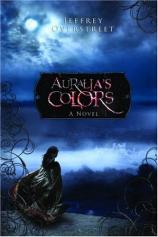Auralia's Colors: The Auralia Thread Series #1
Review
Auralia's Colors: The Auralia Thread Series #1
In
AURALIA’S COLORS, which marks the beginning of The
Auralia Thread fantasy series, culture critic Jeffrey
Overstreet makes a compelling first foray into fiction.
Overstreet opens his story in the imaginative world of The Expanse.
A soon-absent and arrogant queen convinces the remnant of Abascar
to give up all its bright colors. Soon, wearing colors are only for
the privileged; others must turn in anything beautifully pigmented.
The former wealth of colors from days gone by are stored in the
vaults of the palace, presumably to be brought out when
“spring” arrives --- which it never seems to do. And
somewhere, “the Keeper” calls to those who listen. (If
you think there are Christian metaphors here, you’re on the
right track.)
All of this is about to change. The rascally old Gatherer, Krawg,
and his comical sidekick Warney discover a baby girl in a
monster’s footprint alongside the River Throanscall. When the
common folks outside the palace walls take the mysterious Auralia
in to raise her, they quickly find out she’s different. She
grows up semi-wild, at home in the natural world. When she becomes
a teen, she has a chance to enter the House Abascar and to make her
pledge at the “Rites,” away from the perceived drab
colorlessness and drudgery of the Gatherers’ existence. But
Auralia doesn’t see the point.
Auralia questions the system and gently encourages subversion.
Defying the law, she pulls colors from nature and gifts the
Gatherers with her creations: slow-burning gold honeycomb candles,
stonecutters with scarlet sheaths, a pillow of white and yellow and
burgundy. But, as Auralia soon learns, House Abascar punishes
orphans who do not follow the rules.
Overstreet’s narrative is poetic, with vivid splashes of
color, verve and ingenuity. “The child became twigs and burnt
autumn leaves, thin and fisty fingers clutching acorns and seed as
though they were stolen jewels. Her hair hung in tangles, silver
and brown like the bark of apple trees.” To read
AURALIA’S COLORS is to indulge in a cornucopia of prose
pleasures like these.
A whole fantasy world emerges as you turn the pages --- one with
beastman creatures that roar (different but reminiscent of the
“Orcs” of J.R.R. Tolkien), rideable visorcats who purr
and curl up on “a bed of intoxicating madweed” and
rainhounds who bark. Even the dialogue is full of oddities related
to this mystical place; a soldier might call another “you
crusty old vawn nugget” or brag, “I earned that valor
medal for killing two Cent Regus reptiles.” Most of it the
reader will be able to follow; occasionally it becomes
confusing.
The characters are no less spellbinding: the beautiful princess and
queen mad for power with twisted hearts; the impotent king who is
addicted to a powerful potion; an ale boy who has a back story that
tells us he’s not all who he seems to be on the surface; and
an advisor of wizardly dimensions who appears and disappears on the
scene to mentor the prince Cal-raven, who we are unsure of whether
will be a force for good or benign.
What the reader isn’t prepared for is the violence that
suddenly shocks with its intensity in the very last pages of the
book. It’s a startling contrast to the early part of the
story, and the audience may well wonder if it is a precursor to
more violence in the coming sequels. The violence might be
upsetting to younger readers, although it is certainly no stronger
than what you see on previews during a cable television commercial.
It also vividly illustrates the evil found in Abascar. Still, this
is the only caution I’d have about recommending the book to
younger fantasy fans.
But the biggest warning to take away is this: If you read
AURALIA’S COLORS, “The Red Strand” in The
Auralia Thread series, you’ll be hooked. I know
I’ll be eagerly awaiting the next installment.
Reviewed by Cindy Crosby. Contact Cindy at phrelanzer@aol.com. on December 22, 2010




